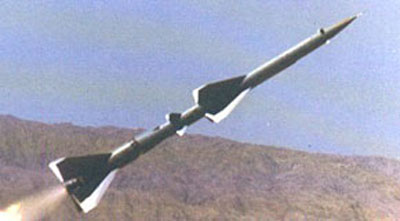Facts
| Designation | Tondar-69 (CSS-8) |
| Missile Variants | N/A |
| Mobility | Road-Mobile |
| Designer/Producer | China |
| Range | 150KM |
| Warhead Type and Weight | HE, 190 kg |
| MIRV and Yield | No MIRV |
| Guidance System/ Accuracy | Unknown |
| Stages/ Propellant | Two Stage/ Solid Propellant |
| IOC | 1992 |
| Status/ Number of Units | Estimated 100 |
Development
The Iranian CSS-8 (M-7) is a short range, solid fueled, ballistic missile. It is believed Iran acquired 200 of the CSS-8 (M-7) from China in the late 1980s. [1] Iran later renamed the system Tondar-69. The missile has a range of 150km (93 miles) and carries a payload of 190kg. This missile is also capable of carrying a nuclear warhead. The CSS-8 (M-7) is designed to launch from a tracked launcher vehicle; thus, as a road mobile system, the CSS-8 (M-7) can be launched from any location. [2] Although the CSS-8 (M-7) entered into service in 1992, it may soon become obsolete as less than 100 of the missiles are in operation since only 20 tracked launcher vehicles are in service. [3] Furthermore, the system is reported to have poor accuracy.
 Strategic Implications
Strategic Implications
Given the CSS-8 (M-7) short range (150km) and poor accuracy, it poses a limited threat to the Middle East.
[1] Missile Threat. “Tondar 69 Missile Threat.” Last modified November 3, 2012. http://missilethreat.com/missiles/tondar-69/.
[2] Andrew Feicker. “Iran’s Ballistic Missile Capabilities.” Congressional Research Service (2004): pg 1-2. Accessed April 10, 2014. http://fpc.state.gov/documents/organization/39332.pdf.
[3] Missile Threat, 2012.
